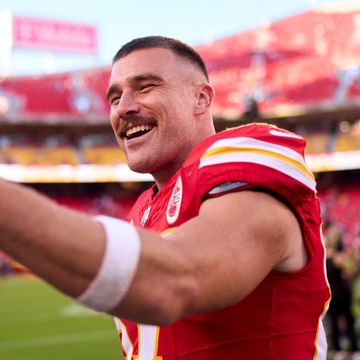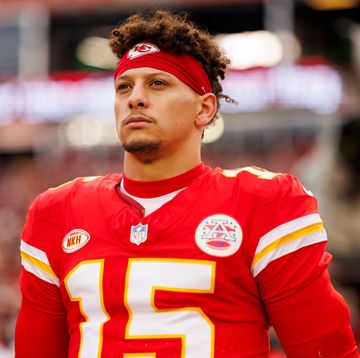On the football field, Steve McNair was the unflappable quarterback often willing his team to victory. Behind the scenes, the introspective NFL star enjoyed fishing and watching TV shows such as The Price Is Right and The Andy Griffith Show. Friends and fans treasured McNair for his amiable personality, making his 2009 death at age 36 all the more puzzling and heartbreaking.
The new sports documentary Untold: The Murder of Air McNair, now streaming on Netflix, examines McNair’s rise to gridiron stardom and the days leading up to July 4, 2009, when police found the retired NFL star and his mistress dead inside a Nashville condominium. The case was eventually ruled a murder-suicide, though many questions about the shootings still linger. Namely, how could such a tragedy strike the charitable and family-focused McNair?
The former league MVP remains a beloved figure 15 years after his death, but McNair grappled with his prominent status more than many realized.
McNair was a college superstar
McNair’s discipline and determination to make it as a football player started with his mother, Lucille, and oldest brother, Fred.
Lucille, who raised Steve in Mount Olive, Mississippi, described him as “quiet, intelligent, and studious,” as well as a good listener—though not immune to occasional misbehavior. “The kids loved to play football, but they knew that work came first. And when they forgot that, they were punished, but I always let them go back out to play football afterward,” Lucille told The New York Times in 1994. “I wanted my kids to be raised to be respectful, and around here, that’s the only way you are raised.”
Steve aspired to be like Fred, who was four years older than him. Fred was a football star at Mount Olive High School and later Alcorn State University, a small historically Black institution in Mississippi. Tired of everyone’s praise of Fred as the best athlete in the family, Steve vowed in the ninth grade to one day surpass his brother.
Steve played basketball and baseball but excelled most in football. He led Mount Olive to a state championship as a junior and became an All-American selection at both quarterback and safety. He turned down a contract from the Seattle Mariners MLB franchise and offers from multiple Division I schools so that he could continue to play QB. Instead, Steve chose Alcorn State like his big brother.
In college, Steve set multiple school and national records. Wearing his brother Fred’s No. 9, he accumulated 16,823 total yards of offense—the most ever by a player in the NCAA’s Football Championship Subdivision. In 1994, he became a finalist for the Heisman Trophy.
It was clear “Air McNair” was ready for the NFL.
He then became a beloved NFL quarterback
In 1995, the Houston Oilers drafted McNair third overall, the highest selection ever for a Black quarterback at the time. McNair spent 11 seasons with the franchise and established himself as a star quarterback following the team’s relocation to Nashville two years later.
Rebranded as the Tennessee Titans in 1999, the team became a yearly playoff contender. Led by McNair, the Titans made their only Super Bowl appearance in January 2000. Receiver Kevin Dyson was tackled one yard from the end zone on the final play of a 23-16 loss to the St. Louis Rams. Still, McNair made history as only the second Black quarterback to start in the big game following Doug Williams in 1987.
In 2003, McNair threw for 3,387 yards and had 28 total touchdowns as the Titans made the playoffs for the fourth time in five seasons. He then became the first Black quarterback to win NFL MVP honors, sharing the award with Peyton Manning of the Indianapolis Colts.
McNair’s generosity away from the field was equally notable. In 1999, he started an annual youth football camp at Mississippi Gulf Coast Community College and added a second one in Nashville. “[Steve was] touchable. Just so touchable and approachable and always spending time with those campers,” sports anchor Mitchell Williams told The Tennessean. “A generation of young people came to Steve’s camps.”
He also established the Steve McNair Foundation benefitting youth charities. The organization helped raise $100,000 for Hurricane Katrina relief efforts. Because of his charitable nature, McNair became the Titans’ 2005 nominee for the NFL Man of the Year award, named after Walter Payton. But for all his successes on the field and in the community, McNair began dealing with troubles in his personal life.
His coach said McNair self-medicated to endure injury-induced pain
Because of his dual-threat playing style, McNair suffered multiple injuries and often played through them despite the risks. During his career, he dealt with bone spurs in his ankle, bruised ribs, a strained calf, and contracted an infection following shoulder surgery.
In September 2000, McNair was tackled on a scramble attempt during a game against the Kansas City Chiefs. The helmet hit to his chest severely bruised his sternum and landed the quarterback in the hospital, leading him to contemplate retirement. “When I went to go see him at the hospital, he told me he was done playing. He couldn’t play anymore,” McNair’s former Titans coach Jeff Fisher said in the 2012 documentary A Football Life.
But only two weeks later, McNair returned to the field when his backup suffered an injury against the Pittsburgh Steelers. With the Titans down four points in the fourth quarter, McNair completed three passes on Tennessee’s final drive, including the game-winning touchdown. “Soon as he stepped in the huddle, everybody knew that we were going to win the game,” teammate Derrick Mason told The Tennessean.
McNair’s toughness endeared him to fans and his teammates. But in A Football Life, Fisher suggested the repeated injuries had taken their toll on McNair. “Considering what he’d been through late in his career, he was dealing with some pain,” Fisher said. “So, he’s self-medicating now, you know, whether it was alcohol or some kind of medication, painkillers, and things like that.
“There were a few mornings that I knew he had a hard night. He’d sleep it off, and he’d say, ‘I’ll get it together.’”
While there was no concrete proof McNair was struggling with substance abuse, alcohol did factor into his May 2003 arrest in Nashville. Police charged the quarterback with driving under the influence and illegal gun possession, though a judge dismissed the charges a year later.
Retirement wasn’t easy for McNair
McNair played his final two seasons with the Baltimore Ravens before retiring from the NFL in April 2008, citing his health and desire to spend time with his family as determining factors. “It’s a sad, emotional day for me. I’m trying to do the best I can to hold it in,” McNair said. “But at the same time, I’m opening up a lot more doors for the future. I can become now the father I need to be to my kids.”
Back in 1997, McNair had married Mechelle Cartwright, whom he met in college. They had two sons, Tyler and Trenton, together while Steve also had sons Steve Jr. and Steven from prior relationships. While McNair cherished time with his children, including attending Steve Jr.’s football games, his marriage to Mechelle had clear flaws. According to The Tennessean, McNair and a friend rented an apartment in Nashville where the retired athlete engaged in multiple affairs.
McNair was also known to frequent bars and clubs in Nashville. It was at a Dave & Buster’s restaurant where he met server Sahel Kazemi in December 2008. Their romantic relationship that began soon after would ultimately lead to his death.
“When you transition from the game—mentally and physically and emotionally transition—you go through so much change,” McNair’s teammate Eddie George said. “He was probably searching for something. Things in the wrong places.”
An affair led to his shocking murder
McNair was 35 when he met the 19-year-old Kazemi, known by her nickname “Jenni.” The couple did little to hide their relationship, vacationing together in Las Vegas and Florida. On her 20th birthday in May 2009, McNair co-signed with Kazemi on the purchase of a new car.
But according to court documents, Kazemi soon encountered financial difficulties and discovered evidence of McNair’s other affairs. Their final interactions included Kazemi’s arrest on DUI charges on July 2, as well as concerning text messages indicating her growing panic over her large bills.
Both were found dead from gunshot wounds on July 4. Police eventually determined Kazemi shot McNair four times before turning the gun on herself.
People who knew McNair well couldn’t believe the circumstances. “It was like, he has no enemies. Who would want to do that to him?” Mason said. “This guy would give you the shirt off his back, so who would want to murder him the way they did?”
Around 5,000 people attended McNair’s funeral at the University of Southern Mississippi on July 11, 2009. Fans left notes for McNair’s family during a public service at the Titans’ home stadium.
Although the murder investigation revealed more details of his affair with Kazemi and other facets of his life, McNair remains a beloved figure to many. The Titans retired his No. 9 jersey number during a September 2019 ceremony.
Former teammates remember McNair as a dedicated athlete and family man, and they don’t want his legacy to be defined by off-field transgressions. “I know how much he loved Mechelle. I know how much he loved his kids,” former Titans guard Zach Piller said in A Football Life. “I want Mechelle to remember him as a loving husband and a great father. I hope they grow up to be like Steve.”
Watch Untold on Netflix
Untold: The Murder of Air McNair is now streaming on Netflix. The sports documentary series continues with volumes about infamous Michigan football staffer Connor Stalions on August 27 and former USWNT goalkeeper Hope Solo on September 3.
Tyler Piccotti joined the Biography.com staff as an Associate News Editor and is now the News and Culture Editor. He previously worked as a reporter and copy editor for a daily newspaper recognized by the Associated Press Sports Editors. In his current role, he shares the true stories behind your favorite movies and TV shows and profiles rising musicians, actors, and athletes. When he's not working, you can find him at the nearest amusement park or movie theater and cheering on his favorite teams.














